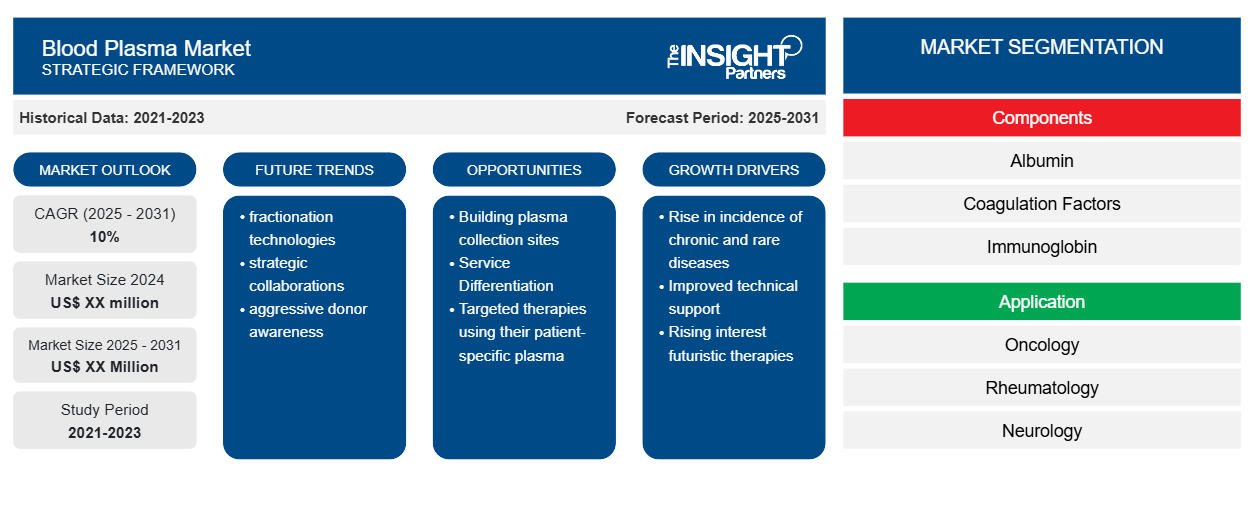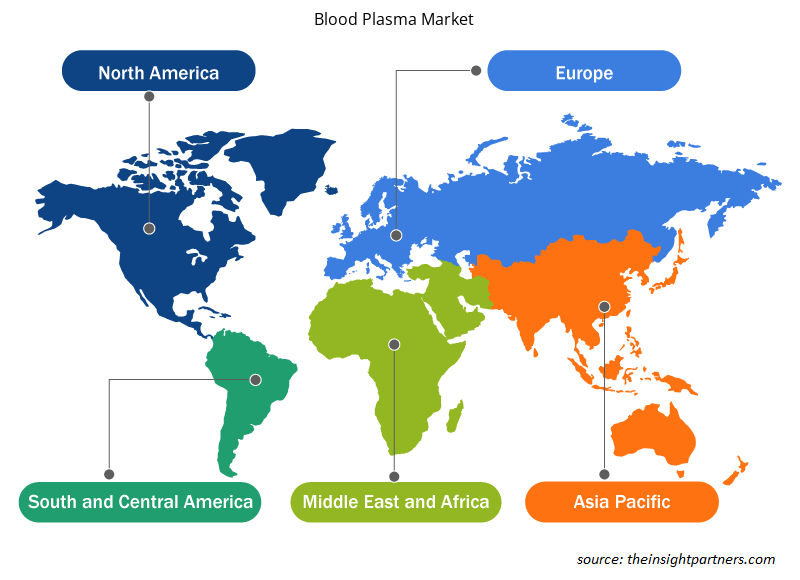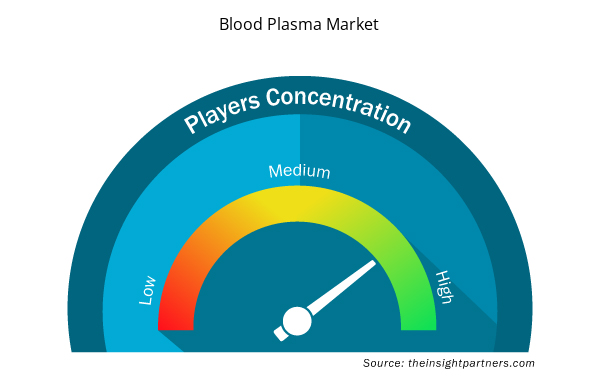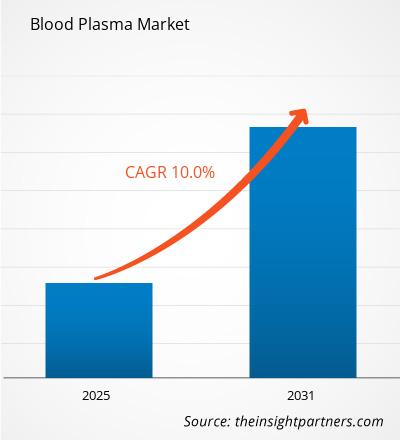The Blood Plasma Market is expected to register a CAGR of 10% from 2025 to 2031, with a market size expanding from US$ XX million in 2024 to US$ XX Million by 2031.
The Blood Plasma Market report delivers a comprehensive analysis categorized by component Type, Application, and End User. It includes a regional breakdown highlighting key markets and countries, providing a global perspective. Market evaluations are presented in US dollars (US$), offering insights into market dynamics, growth trends, and competitive landscapes across various segments. This information empowers stakeholders to recognize opportunities and make informed decisions in the evolving blood plasma industry.
Purpose of the Report
The report Blood Plasma Market by The Insight Partners aims to describe the present landscape and future growth, top driving factors, challenges, and opportunities. This will provide insights to various business stakeholders, such as:
- Technology Providers/Manufacturers: To understand the evolving market dynamics and know the potential growth opportunities, enabling them to make informed strategic decisions.
- Investors: To conduct a comprehensive trend analysis regarding the market growth rate, market financial projections, and opportunities that exist across the value chain.
- Regulatory bodies: To regulate policies and police activities in the market with the aim of minimizing abuse, preserving investor trust and confidence, and upholding the integrity and stability of the market.
Blood Plasma Market Segmentation
Components
- Albumin
- Coagulation Factors
- Immunoglobin
- Hyperimmune and Other Plasma Fractionation Products
Application
- Oncology
- Rheumatology
- Neurology
- Transplant
- Immunology
- Pulmonology and Hematology
End User
- Research Laboratories
- Hospitals and Clinics
- Academic Institutions
Geography
- North America
- Europe
- Asia-Pacific
- South and Central America
- Middle East and Africa
Customize This Report To Suit Your Requirement
You will get customization on any report - free of charge - including parts of this report, or country-level analysis, Excel Data pack, as well as avail great offers and discounts for start-ups & universities
Blood Plasma Market: Strategic Insights

- Get Top Key Market Trends of this report.This FREE sample will include data analysis, ranging from market trends to estimates and forecasts.
Blood Plasma Market Growth Drivers
- Rise in incidence of chronic and rare diseases: The incidence of chronic and rare diseases such as haemophilia and immune deficiencies, a rising geriatric population, increased incidence of blood disorders, and blood consumption owing to diagnosed diseases are projected to fuel the global blood plasma market.
- Improved technical support: Improved technical support for plasma collection and processing from a regulatory standpoint and enhance availability of plasma for development of futuristic plasma products for various disease curing applications is driving the blood plasma market growth.
- Rising interest futuristic therapies: Moreover, rise in patient, physician and government interest in futuristic therapies such as immunotherapy and regenerative medicine is likely to push the market ahead. COVID-19 has played a significant role in recognising the need of blood plasma for therapeutics development, thus widening its applications, strengthening the confidence of various stakeholders in the same and increasing investments to establish these plasma collection centres.
Blood Plasma Market Future Trends
- fractionation technologies: The most celebrated achievements in fractionation technologies are being reported to increase the yield from production of plasma-derived products. Such plasma products are moving away from being general medications to targeted and more personalised or customised medicines.
- strategic collaborations: Ongoing reports of collaborations between the plasma fractionators and the pharma companies point towards the intent to stay on the top of supply chain of human blood plasma.
- aggressive donor awareness: Promising results of the campaigns to create more aggressive donor awareness are driving up donor participation. ? The regulators are steadfast demanding the vital safety and quality standards from the companies that enable patients’ treatment with the best possible outcomes. The companies are passionately innovating their practices to meet and satisfy all these demands.
Blood Plasma Market Opportunities
- Building plasma collection sites: Businesses have an opportunity to step in as well, since this massive need for plasma-derived therapies creates a niche for enterprises to invest in the building of plasma collection sites and in other areas where healthcare needs are increasing. Partnerships with health service providers and with pharmaceutical companies allow companies to leverage this capital and enable the development of new therapies, new products and even new lines of products.
- Service Differentiation: Furthermore, new fractionation technologies hold potential for greater value-adding or cost-effectiveness, as in higher degrees of plasma processing. Lastly, treatment development, especially for the treatment of chronic and rare diseases, can be a source of differentiation for clinics competing with each other. Public awareness and sponsorship can lead to improved donation rates, further enhancing supply, and more importantly, additional goodwill in the community.
- Targeted therapies using their patient-specific plasma: Along with the trend of personalized medicine, companies also can create targeted therapies using their patient-specific plasma. However, capitalisation in other markets might have a better position. It includes further growth into those emerging markets having increased prevalence of health spending. Moreover, increased safety rules with better product quality will assist gaining confidence and trust from end product customers, positioning the company as one of a leader in blood plasma market.
Blood Plasma Market Regional Insights
The regional trends and factors influencing the Blood Plasma Market throughout the forecast period have been thoroughly explained by the analysts at Insight Partners. This section also discusses Blood Plasma Market segments and geography across North America, Europe, Asia Pacific, Middle East and Africa, and South and Central America.

- Get the Regional Specific Data for Blood Plasma Market
Blood Plasma Market Report Scope
| Report Attribute | Details |
|---|---|
| Market size in 2024 | US$ XX million |
| Market Size by 2031 | US$ XX Million |
| Global CAGR (2025 - 2031) | 10% |
| Historical Data | 2021-2023 |
| Forecast period | 2025-2031 |
| Segments Covered |
By Components
|
| Regions and Countries Covered | North America
|
| Market leaders and key company profiles |
Blood Plasma Market Players Density: Understanding Its Impact on Business Dynamics
The Blood Plasma Market market is growing rapidly, driven by increasing end-user demand due to factors such as evolving consumer preferences, technological advancements, and greater awareness of the product's benefits. As demand rises, businesses are expanding their offerings, innovating to meet consumer needs, and capitalizing on emerging trends, which further fuels market growth.
Market players density refers to the distribution of firms or companies operating within a particular market or industry. It indicates how many competitors (market players) are present in a given market space relative to its size or total market value.
Major Companies operating in the Blood Plasma Market are:
- CSL
- Grifols
- Shire
- Octapharma
- Kedrion
Disclaimer: The companies listed above are not ranked in any particular order.

- Get the Blood Plasma Market top key players overview
Key Selling Points
- Comprehensive Coverage: The report comprehensively covers the analysis of products, services, types, and end users of the Blood Plasma Market, providing a holistic landscape.
- Expert Analysis: The report is compiled based on the in-depth understanding of industry experts and analysts.
- Up-to-date Information: The report assures business relevance due to its coverage of recent information and data trends.
- Customization Options: This report can be customized to cater to specific client requirements and suit the business strategies aptly.
The research report on the Blood Plasma Market can, therefore, help spearhead the trail of decoding and understanding the industry scenario and growth prospects. Although there can be a few valid concerns, the overall benefits of this report tend to outweigh the disadvantages.
- Historical Analysis (2 Years), Base Year, Forecast (7 Years) with CAGR
- PEST and SWOT Analysis
- Market Size Value / Volume - Global, Regional, Country
- Industry and Competitive Landscape
- Excel Dataset



Report Coverage
Revenue forecast, Company Analysis, Industry landscape, Growth factors, and Trends

Segment Covered
This text is related
to segments covered.

Regional Scope
North America, Europe, Asia Pacific, Middle East & Africa, South & Central America

Country Scope
This text is related
to country scope.
Frequently Asked Questions
Some of the customization options available based on request are additional 3-5 company profiles and country-specific analysis of 3-5 countries of your choice. Customizations are to be requested/discussed before making final order confirmation, as our team would review the same and check the feasibility.
Key market players are - CSL, Grifols, Shire, Octapharma, Kedrion, LFB, Biotest, Sanquin, China Biologic Products
The market is expected to register a CAGR of 10% during 2023-2031
Continued growth is supported by a rising need for plasma-derived therapies for chronic diseases, aging populations and an improved regulatory landscape, all fuelled by the COVID-19 pandemic, with increased levels of investment in plasma collection centers and awareness of blood disorders.
Others include improvements in fractionation technologies and attempts at 'precision medicine'. Relations between plasma centres and pharmaceutical companies optimise supply chains, while marketing campaigns increase the number of donors. Moreover, regulatory requirements to promote safe plasma practices stimulated innovative plasma production practices.
The report can be delivered in PDF/PPT format; we can also share excel dataset based on the request.
Trends and growth analysis reports related to Life Sciences : READ MORE..
1. CSL
2. Grifols
3. Shire
4. Octapharma
5. Kedrion
6. LFB
7. Biotest
8. Sanquin
9. China Biologic Products
10. Bio Products Laboratory

 Get Free Sample For
Get Free Sample For